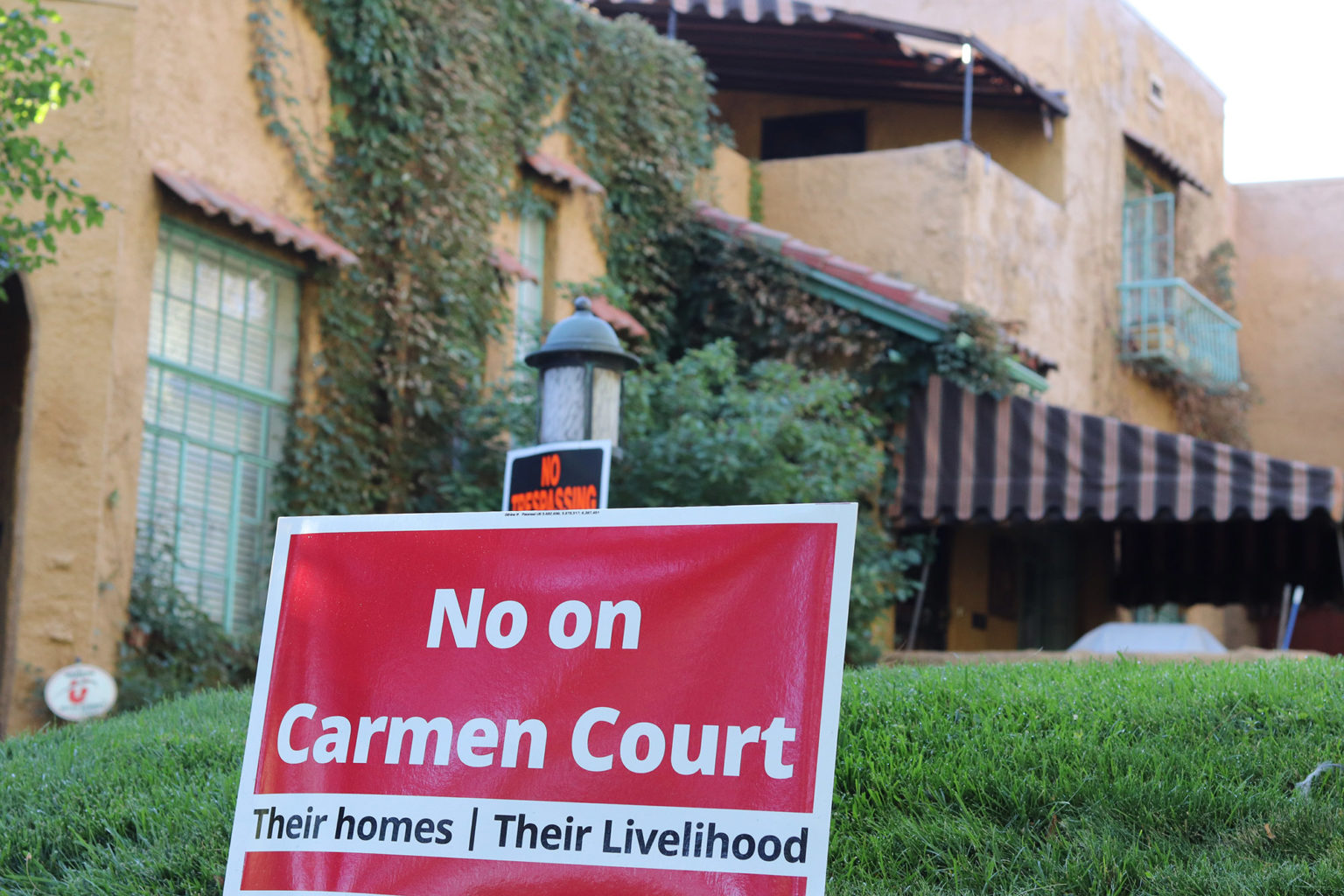
The effort to designate the Carmen Court condo complex a city landmark ended when the application was withdrawn last week, clearing the way for the structure to be sold, demolished and redeveloped. (BusinessDen file)
The fight over the future of a 95-year-old condominium complex off Speer Boulevard is over — without the compromise parties had been pursuing for months.
At the end of last week, the Denver residents fighting to preserve the Carmen Court complex, at 900 E. 1st Ave., agreed to withdraw their application asking the city to designate the structure a landmark.
The decision ends a months-long battle between the preservationists and the owners of the six condos, who are under contract to sell the building and its land to Houston-based developer Hines. It means that Denver City Council will not be tasked with making the final decision on the matter, as they had been slated to do on Nov. 2.

A rendering of Hines’ proposed five-story senior living complex to be built on the Carmen Court site. (Courtesy of Hines)
It also means that Carmen Court is poised to be demolished. Hines wants to build a five-story senior living complex on the property, as well as the site of a few homes to the south the company is also under contract to buy. Landmark status would have effectively prevented demolition of Carmen Court.
In an email to supporters Friday, Friends of Carmen Court — a group affiliated with the landmark applicants — wrote: “The owners of the building are our neighbors, and while we hoped they would change their minds and support the preservation of this structure, they have not. We wish them the best as they move on from this property.”
Katie Sisk, who owns one of Carmen Court’s six units, called the withdrawal “the right thing to do.”
“This is certainly a huge win for the owners of the six units, but also owners in the Denver metro area as a whole when it comes to property rights,” she said.
The withdrawal represents an about-face for the landmark proponents. Two weeks ago, Sarah McCarthy, a leader of Friends of Carmen Court, said she didn’t expect the applicants to take that step.
“What changed is we counted votes,” McCarthy told BusinessDen over the weekend. “We didn’t think we had the votes to get it through council.”
No council members have publicly indicated whether they intended to support the landmark designation, although Jolon Clark and Chris Herndon had expressed a hope that a compromise could be found that would avoid the council weighing in.
McCarthy said the belief the preservationists didn’t have enough council support was largely an informed gut feeling, noting she has been involved with other landmark applications in the past.
When controversial measures that are neighborhood-specific come before the council, she noted, members often defer to the opinion of the member who represents that district. In the case of Carmen Court, that’s Clark.
“I think Jolon made it clear he was very conflicted,” McCarthy said. “You can’t get something through council of this nature without the home council member stepping up and encouraging support for their position.”

From left to right: Karen Roehl, Mary Ann O’Hara and husband Gary Laura, Katie Sisk and Terrie Curry collectively own four of the units at Carmen Court. (Thomas Gounley photo)
McCarthy said she still believes Carmen Court is worthy of preservation, and noted that those wishing to preserve it followed a process outlined by the city.
The withdrawal of the application did come with one commitment from Hines.
Friends of Carmen Court said the company has agreed to not demolish the structure until it is ready to begin constructing its new project. That is likely to be months from now, given that Hines still needs to close on the land and get its development plans approved by the city, along with construction permits.
McCarthy noted the broad economic uncertainty associated with the pandemic, and said the agreement — which Clark was involved in negotiating — could avoid a situation in which the company demolishes Carmen Court but ends up not building the senior living complex. And theoretically, it means an alternative buyer could still swoop in.
“Every day a building stands is another day that it stands,” she said.
Hines declined to discuss its timeline for purchase and redevelopment.
“We are pleased that a compromise was reached with the three applicants and applaud the city for its ability to facilitate this deal,” Hines Managing Director Chris Crawford said in a statement. “This is a positive outcome for homeowners in the Denver metro area — and most importantly the group of Carmen Court homeowners who championed this cause with patience and strength.”
The agreement delaying demolition until necessary is not the compromise that the owners and landmark applicants, with the help of a mediator, have been seeking for months.
That effort revolved around finding an alternative buyer for the property who would preserve the structure, but was unsuccessful even when the parties were given an additional 45 days. McCarthy previously said a major challenge was that Hines wanted the alternative buyer to pay their agreed-upon price for Carmen Court, although with additional expenses Hines has accrued.
A secondary hope for compromise — allowing Hines to build taller on other portions of the site in exchange for preserving at least part of Carmen Court — was rejected by Hines as impractical.
Carmen Court is the third owner-opposed landmark application to gain support in Denver in the last 18 months.
The other two — for the Tom’s Diner building at 601 E. Colfax Ave. and the former Olinger Moore Howard Chapel at 4345 W. 46th Ave. — also found a resolution before going to the council for a final vote. In those cases, however, alternative buyers were found, and the buildings avoided the wrecking ball.
The council has only designated one building as a landmark against the wishes of its owner: the former Beth Eden Baptist Church at 3241 Lowell Blvd. in 2014.

The effort to designate the Carmen Court condo complex a city landmark ended when the application was withdrawn last week, clearing the way for the structure to be sold, demolished and redeveloped. (BusinessDen file)
The fight over the future of a 95-year-old condominium complex off Speer Boulevard is over — without the compromise parties had been pursuing for months.
At the end of last week, the Denver residents fighting to preserve the Carmen Court complex, at 900 E. 1st Ave., agreed to withdraw their application asking the city to designate the structure a landmark.
The decision ends a months-long battle between the preservationists and the owners of the six condos, who are under contract to sell the building and its land to Houston-based developer Hines. It means that Denver City Council will not be tasked with making the final decision on the matter, as they had been slated to do on Nov. 2.

A rendering of Hines’ proposed five-story senior living complex to be built on the Carmen Court site. (Courtesy of Hines)
It also means that Carmen Court is poised to be demolished. Hines wants to build a five-story senior living complex on the property, as well as the site of a few homes to the south the company is also under contract to buy. Landmark status would have effectively prevented demolition of Carmen Court.
In an email to supporters Friday, Friends of Carmen Court — a group affiliated with the landmark applicants — wrote: “The owners of the building are our neighbors, and while we hoped they would change their minds and support the preservation of this structure, they have not. We wish them the best as they move on from this property.”
Katie Sisk, who owns one of Carmen Court’s six units, called the withdrawal “the right thing to do.”
“This is certainly a huge win for the owners of the six units, but also owners in the Denver metro area as a whole when it comes to property rights,” she said.
The withdrawal represents an about-face for the landmark proponents. Two weeks ago, Sarah McCarthy, a leader of Friends of Carmen Court, said she didn’t expect the applicants to take that step.
“What changed is we counted votes,” McCarthy told BusinessDen over the weekend. “We didn’t think we had the votes to get it through council.”
No council members have publicly indicated whether they intended to support the landmark designation, although Jolon Clark and Chris Herndon had expressed a hope that a compromise could be found that would avoid the council weighing in.
McCarthy said the belief the preservationists didn’t have enough council support was largely an informed gut feeling, noting she has been involved with other landmark applications in the past.
When controversial measures that are neighborhood-specific come before the council, she noted, members often defer to the opinion of the member who represents that district. In the case of Carmen Court, that’s Clark.
“I think Jolon made it clear he was very conflicted,” McCarthy said. “You can’t get something through council of this nature without the home council member stepping up and encouraging support for their position.”

From left to right: Karen Roehl, Mary Ann O’Hara and husband Gary Laura, Katie Sisk and Terrie Curry collectively own four of the units at Carmen Court. (Thomas Gounley photo)
McCarthy said she still believes Carmen Court is worthy of preservation, and noted that those wishing to preserve it followed a process outlined by the city.
The withdrawal of the application did come with one commitment from Hines.
Friends of Carmen Court said the company has agreed to not demolish the structure until it is ready to begin constructing its new project. That is likely to be months from now, given that Hines still needs to close on the land and get its development plans approved by the city, along with construction permits.
McCarthy noted the broad economic uncertainty associated with the pandemic, and said the agreement — which Clark was involved in negotiating — could avoid a situation in which the company demolishes Carmen Court but ends up not building the senior living complex. And theoretically, it means an alternative buyer could still swoop in.
“Every day a building stands is another day that it stands,” she said.
Hines declined to discuss its timeline for purchase and redevelopment.
“We are pleased that a compromise was reached with the three applicants and applaud the city for its ability to facilitate this deal,” Hines Managing Director Chris Crawford said in a statement. “This is a positive outcome for homeowners in the Denver metro area — and most importantly the group of Carmen Court homeowners who championed this cause with patience and strength.”
The agreement delaying demolition until necessary is not the compromise that the owners and landmark applicants, with the help of a mediator, have been seeking for months.
That effort revolved around finding an alternative buyer for the property who would preserve the structure, but was unsuccessful even when the parties were given an additional 45 days. McCarthy previously said a major challenge was that Hines wanted the alternative buyer to pay their agreed-upon price for Carmen Court, although with additional expenses Hines has accrued.
A secondary hope for compromise — allowing Hines to build taller on other portions of the site in exchange for preserving at least part of Carmen Court — was rejected by Hines as impractical.
Carmen Court is the third owner-opposed landmark application to gain support in Denver in the last 18 months.
The other two — for the Tom’s Diner building at 601 E. Colfax Ave. and the former Olinger Moore Howard Chapel at 4345 W. 46th Ave. — also found a resolution before going to the council for a final vote. In those cases, however, alternative buyers were found, and the buildings avoided the wrecking ball.
The council has only designated one building as a landmark against the wishes of its owner: the former Beth Eden Baptist Church at 3241 Lowell Blvd. in 2014.

Leave a Reply